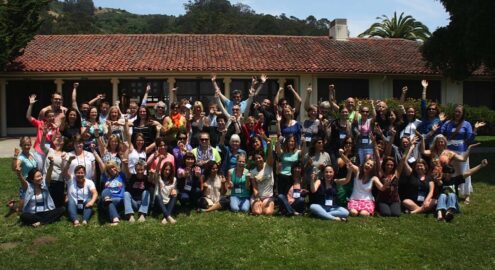What Are They?
According to the Collaborative for Academic, Social, and Emotional, Learning (CASEL), social-emotional learning (SEL) is “the process through which all young people and adults acquire and apply the knowledge, skills, and attitudes to develop healthy identities, manage emotions and achieve personal and collective goals, feel and show empathy for others, establish and maintain positive relationships, and make responsible and caring decisions.”
Self-awareness and self-management are two of the five components that make up CASEL’s model of SEL.
Self-Awareness is simply the ability to be aware of one’s inner life–one’s emotions, thoughts, behaviors, values, preferences, goals, strengths, challenges, attitudes, mindsets, and so forth– and how these elements impact behavior and choices across contexts.
A student who is self-aware may notice her fearful emotional response as she is about to take a test. She may feel her heart beat faster and her stomach clench, making her thoughts race as she worries about failing the test. To get out of the test, she considers telling her teacher that she feels sick, but in the end, she recognizes that this behavior is a result of her emotions and thoughts running amok, and she accepts that these reactions can occur when she experiences anxiety.
Skills that develop self-awareness include:
- Identifying and analyzing one’s emotions, and how they affect others
- Understanding the relationship between one’s emotions, thoughts, values, and behaviors
- Integrating personal and social identities
- Identifying personal, cultural, and linguistic assets
- Demonstrating honesty and integrity
- Examining prejudices and biases
- Experiencing self-efficacy
- Having a growth mindset
- Developing interests and a sense of purpose
Self-management is the ability to navigate and shift in a healthy way one’s thoughts, emotions, and behaviors in order to make decisions and reach goals that benefit oneself and others.
A new sixth grader who is anxious about starting middle school remembers learning from her fifth grade teacher that when she is feeling scared, she can change how she feels by thinking differently about the situation. So, instead of dreading her new school, this student decides to view it as an adventure—one that might bring her new friends, wonderful teachers, and exciting opportunities.
Self-management skills include:
- Regulating and expressing one’s emotions thoughtfully
- Demonstrating perseverance and resilience to overcome obstacles
- Sustaining healthy boundaries
- Identifying and using stress management strategies
- Setting personal and collective goals
- Using planning and organizational skills
- Showing the courage to take initiative
- Demonstrating personal and collective agency
- Maintaining attention
- Using feedback constructively
- Practicing self-compassion
Ultimately, self-awareness and self-management are closely linked. For example, being able to stop and calm down when one is upset (self-management), requires skills like recognizing and labeling the emotions and considering how they might be affecting one’s behavior choices (self-awareness).
For a deeper dive into the science and practical school-based examples of this science in action, click on the following topics:
SEL for Students: The Basics of Emotions
SEL for Students: Emotion Regulation
SEL for Students: Emotions and Learning
SEL for Students: Emotions and Culture
Why Are They Important?
Overall, research reveals that students with social and emotional skills perform better academically, have stronger relationships with peers and teachers, experience greater well-being, and engage in less risky behavior. In addition, SEL skills positively impact education, employment, and mental health outcomes into adulthood.
More specifically, several components of self-awareness and self-management show the following outcomes:
“Emotion knowledge” is key to student success.
- Young children who can accurately read facial expressions of emotions and assign an appropriate emotion to a situation perform better academically, have fewer behavior problems, and demonstrate greater prosocial (kind, helpful) behavior.
- These skills continue to help them as the years go on: first graders who showed little knowledge of emotions were more likely to report feelings of loneliness, sadness, and anxiety in fifth grade.
- Teens who score high in emotional intelligence have greater academic success, fewer mental health issues, and better attitudes towards teachers and schools. (Note that beliefs about emotions vary by culture. Click here for more information.)
Managing emotions in a healthy way gives students a head start.
- Students of all ages who can regulate their emotions—or monitor, evaluate, and change their emotional responses—perform better academically, have stronger relationships with teachers and peers, experience greater mental well-being, and engage in less risky behavior. (Note that emotion regulation strategies and outcomes vary by culture. Click here for more information.)
Using self-control to keep studying instead of checking Instagram really matters.
- Students who exhibit self-control—or the ability to regulate thoughts, feelings, and actions when temptation strikes—have better grades (at every level), are more likely to graduate from high school and college, and have higher test scores.
- Self-control also leads to better interpersonal skills, higher self-esteem, and lower risky behavior.
A “growth mindset” benefits students’ academic and social lives.
- Research shows that students with growth mindsets related to intelligence tend to perform better academically.
- New research suggests that developing students’ social and emotional mindsets may increase well-being and happiness, boost social competence, reduce biases, and promote prosocial (kind and helpful) behavior. For more information, click here.
Goals bolster student achievement.
- Studies have found that “hope”—or the ability to achieve goals—is linked to greater academic achievement, creativity, and problem-solving skills, as well as less depression and anxiety.
- Students high in “hope” know how to create a roadmap to reaching a goal, including alternate routes when obstacles arise, and also have the belief, motivation, and confidence to achieve their goals.
Practices

Moving Forward with Hope

A Hopeful Plan

Is Fair, Fair?

Truth or Tale?

A Hopeful Legacy

Mindshifts: An Intellectual Humility Reflection Tool

Become an Admitter

Checking Your Perspective

Asking Effective Interview Questions

What Kind of Happy Are You?

Asking Powerful Questions

Practicing Shallow vs. Deep Curiosity

Awe-Inspiring Affirmations

Seeds of Self-Compassion

Art on Purpose

Assessing Your School Climate

Using Art to Build Bridges

Courage Blooms

Do you want to dive deeper into the science behind our GGIE practices? Enroll in one of our online courses for educators!








